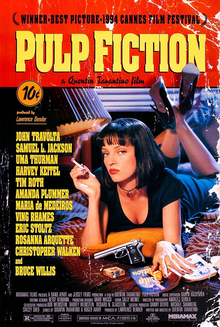
Pulp Fiction
Pulp Fiction is a 1994 American independent crime film written and directed by Quentin Tarantino from a story he conceived with Roger Avary. It tells four intertwining tales of crime and violence in Los Angeles, California. The film stars John Travolta, Samuel L. Jackson, Bruce Willis, Tim Roth, Ving Rhames, and Uma Thurman. The title refers to the pulp magazines and hardboiled crime novels popular during the mid-20th century, known for their graphic violence and punchy dialogue. Tarantino wrote Pulp Fiction in 1992 and 1993, incorporating scenes that Avary originally wrote for True Romance (1993). Its plot occurs out of chronological order. The film is also self-referential from its opening moments, beginning with a title card that gives two dictionary definitions of "pulp". Considerable screen time is devoted to monologues and casual conversations with eclectic dialogue revealing each character's perspectives on several subjects, and the film features an ironic combination of humor and strong violence. TriStar Pictures reportedly turned down the script as "too demented". Miramax co-chairman Harvey Weinstein was enthralled, however, and the film became the first that Miramax fully financed. Pulp Fiction won the Palme d'Or at the 1994 Cannes Film Festival and was a major critical and commercial success. It was nominated for seven awards at the 67th Academy Awards, including Best Picture, and won Best Original Screenplay; Travolta, Jackson, and Thurman were nominated for Best Actor, Best Supporting Actor, and Best Supporting Actress respectively. As a result of the film's success, Travolta's career was reinvigorated, and the previously unknown Jackson and Thurman became household names. The film's development, marketing, distribution, and profitability had a sweeping effect on independent cinema. Pulp Fiction is widely regarded as Tarantino's magnum opus, with particular praise for its screenwriting. The self-reflexivity, unconventional structure, and extensive homage and pastiche have led critics to describe it as a touchstone of postmodern film. It is often considered a cultural watershed, influencing films and other media that adopted elements of its style. The cast was also widely praised, with Travolta, Thurman, and Jackson earning high acclaim. In 2008, Entertainment Weekly named it the best film since 1983 and it has appeared on many critics' lists of the greatest films ever made. In 2013, Pulp Fiction was selected for preservation in the United States National Film Registry by the Library of Congress as "culturally, historically, or aesthetically significant".
You were looking at yourself in the mirror, and you wish you had some pot? A pot. [ Giggles ] A pot belly. Pot bellies are sexy. Well, you should be happy, [ Grunts ] 'cause you have one. Shut up, fatso. I don't have a pot. I have a bit of a tummy, like Madonna when she did "Lucky Star." It's not the same thing. I didn't know there was such a difference between a pot belly and a tummy. The difference is huge. [ Kissing ] Would you like it if I had a pot belly? No. Pot bellies make a man look either oafish or like a gorilla. But on a woman a pot belly's very sexy. The rest of you is normal- normal face, normal legs, normal hips, normal ass- but with a big, perfectly round pot belly. If I had one, I'd wear a T-shirt two sizes too small... to accentuate it. You think men would find that attractive? I don't give a damn what men find attractive. It's unfortunate what we find pleasing to the touch and pleasing to the eye... is seldom the same.
Pulp Fiction
Did you get everything? - Yes, I did. - Good job, Sugar Pop. Did everything go as planned? - You didn't listen to the- Ow! - [ Giggles ] You didn't listen to the radio? I never listen to your fights. Were you the winner? I won, all right. - Are you still retiring? - Sure am. So it all worked out in the finish.
Pulp Fiction
